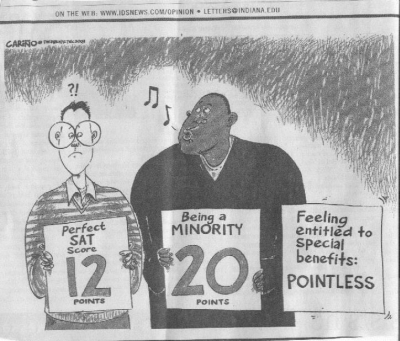
Scott Tibbs
Posted by Hoosier Review, 02-19-2003
Back to opinion page
Radical Leftists continue to attack free speech at IU
Should Indiana University replace the IU letters on its flag with a hammer and sickle? Given the way some students react to speech they disagree with, that symbol would be an appropriate representation for the opinions expressed by some of the more hypersensitive elements of IU’s student population.When I opened up the February 5th Indiana Daily Student, I expected that day’s political cartoon would generate controversy among students supportive of affirmative action. The cartoon featured a nerdy-looking white kid holding a sign with the words “Perfect SAT score: 12 points” and a large black man with the words “Being a minority: 20 points”. The hysterical response of some students to the cartoon has brought up not only the issue of affirmative action, but an issue fundamental to the operation of any newspaper: free speech.
The response to the cartoon’s content was predictable. In one letter to the editor, Michelle McClure wrote, “I believe in free speech”, but called for “responsibility” the presentation of controversial issues. McClure words betray the very spirit of free speech. What is the point of having freedom of speech if people must practice self-censorship due to someone else’s warped sense of “responsibility”? When the Founders wrote the First Amendment, they understood that the very foundation of our right to free speech rests on the ability to say or write controversial and unpopular things.
Others whined that the cartoon oversimplified the issue of affirmative action and did not offer an opposing view. Both complaints are laughable. A political cartoon isn’t supposed to present a detailed, in-depth discussion of a political, social or moral issue. It is to convey a point simply and directly. To expect an editorial cartoon to delve into an issue in a way that a column or even a letter to the editor can is unrealistic and ignores the nature of the medium. Furthermore, those complaining about lack of balance fail to see the irony in their statements. The fact that the IDS publishes letters to the editor and guest columns expressing disagreement with the content of the cartoon shows that the paper is presenting “both sides” of the issue. Instead of using their space to bemoan the fact that “both sides” were not presented, shouldn’t IDS letter-writers focus on presenting the side they feel was missed?
But the most alarming reaction is that of B. Afena Cobham, who wrote a guest column calling for J.P. Benitez to resign from his position as Assistant Opinion Editor, because Benitez selected the cartoon for publication. Such a suggestion is dangerous and must be soundly and publicly rejected by the IDS. If Benitez were to resign over the cartoon he picked for the February 5th IDS, it would set a dangerous precedent for stifling the free exchange of ideas. Should the opinion editors fear for their jobs if they publish a column or editorial that certain segments of the readership finds “offensive”? The cartoon wasn’t even drawn by Benitez. It was first published by the Daily Aztec at San Diego State University, and was then picked up by the IDS.
Sadly, this isn’t a new or uncommon reaction. In April of 2001, the Black Student Union demanded that IDS staff be given “sensitivity training” for the decision to run an ad by David Horowitz opposing reparations for the descendants of slaves. They also demanded that similar advertisements be shown to diversity offices within IU before publication. Last year, the BSU led a crusade to remove a mural from Woodburn Hall because it includes a depiction of the Ku Klux Klan burning a cross. At other universities, campus thugs steal newspapers with “offensive” content.
A newspaper, especially a university newspaper, is supposed to be a place for the free exchange of ideas that may be controversial or even “offensive”. An Opinion Editor should be free to publish opinions from all points of the political spectrum without fearing a backlash form censorship-minded extremists. Whatever one’s views on affirmative action in college admissions are, it is essential that the debate on the issue not be constrained to protect someone’s feelings, especially in a college newspaper whose readership is most directly affected by the issue. It is ironic that the very people advocating censorship of views they dislike paint themselves as advocates of “diversity”. There is a word for that: hypocrisy.
